How to Start a Profitable Nurse Staffing Agency in 13 Steps
Carolyn Young is a business writer who focuses on entrepreneurial concepts and the business formation. She has over 25 years of experience in business roles, and has authored several entrepreneurship textbooks.
David has been writing and learning about business, finance and globalization for a quarter-century, starting with a small New York consulting firm in the 1990s.
Published on April 11, 2022

Fast Facts
$80,000 - $400,000 p.a.
$56,000 - $120,000 p.a.
These are the key elements to think about when starting your nurse staffing agency:
- Hire professionals — Develop a strategy for recruiting qualified nurses. Use job boards, social media, networking events, and partnerships with nursing schools to attract candidates. Implement a thorough credentialing process to verify the qualifications, licenses, and background of nurses. Ensure they meet all regulatory and client-specific requirements.
- Range of services — Decide on the range of services you will offer, such as temporary staffing, permanent placement, per diem shifts, travel nursing, and home healthcare staffing.
- Specialized services — Consider offering specialized services like critical care staffing, pediatric nursing, or nurse practitioners to attract a wider range of clients.
- Licenses and permits — Get necessary licenses and permits required by local, state, and federal authorities to operate a staffing agency. This may include a general business license and healthcare staffing-specific licenses.
- Register your business — A limited liability company (LLC) is the best legal structure for new businesses because it is fast and simple. Form your business immediately using ZenBusiness LLC formation service or hire one of the best LLC services on the market.
- Legal business aspects — Register for taxes, open a business bank account, and get an EIN.
- Online presence — Create a professional website with detailed information about your services, client testimonials, and contact information.
- Partnerships — Build relationships with local healthcare facilities, such as hospitals, clinics, and nursing homes, to secure contracts and generate referrals. Join professional associations like the American Staffing Association (ASA) or the National Association of Travel Healthcare Organizations (NATHO) to access resources, training, and networking opportunities.

Interactive Checklist at your fingertips—begin your nurse staffing agency today!
You May Also Wonder:
How profitable is a nurse staffing agency?
A nurse staffing agency can be very profitable. However, your real reward will come from knowing that you’re helping to solve the nurse shortage crisis that the U.S. is experiencing.
How can I expand my nurse staffing agency to reach more clients and markets?
To expand a nurse staffing agency and reach more clients and markets, conduct market research to identify new areas of demand, develop strategic partnerships with relevant organizations, offer specialized services, expand recruitment efforts, and actively participate in trade shows and industry events.
How can I differentiate my nurse staffing agency from competitors in the market?
To differentiate a nurse staffing agency from competitors, focus on providing exceptional customer service, offer customized staffing solutions, emphasize the quality and qualifications of your nursing staff, highlight unique value propositions such as technology integration or specialized training programs, and gather and showcase positive client testimonials.
What makes a nurse staffing agency successful?
A nurse staffing agency’s success is determined by factors such as building strong relationships with healthcare facilities and candidates, maintaining a reliable and qualified pool of nurses, effectively marketing services, providing excellent customer service, adapting to industry changes, having efficient operations and systems, and continuously striving for excellence in fulfilling client staffing needs.
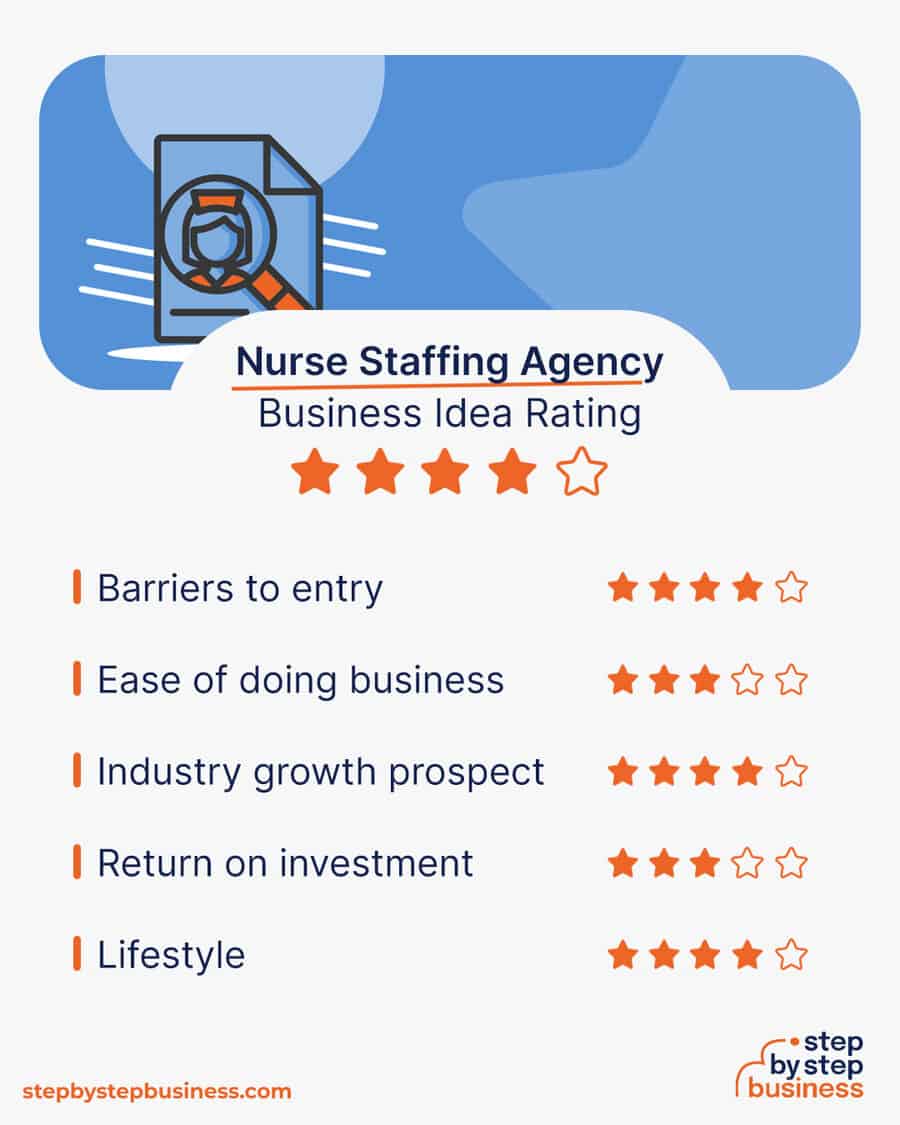
Step 1: Decide if the Business Is Right for You
Pros and cons
Starting a nurse staffing agency has pros and cons to consider before deciding if it’s right for you.
Pros
- Rewarding – Help save lives and fix a serious social crisis
- Flexibility – No office necessary, work from home
- Good Money – Make a nice living on commission
Cons
- Time to Start – It will take time and work to build a reputation
- Crowded Market – Compete with large, established staffing agencies
Nurse staffing industry trends
Industry size and growth
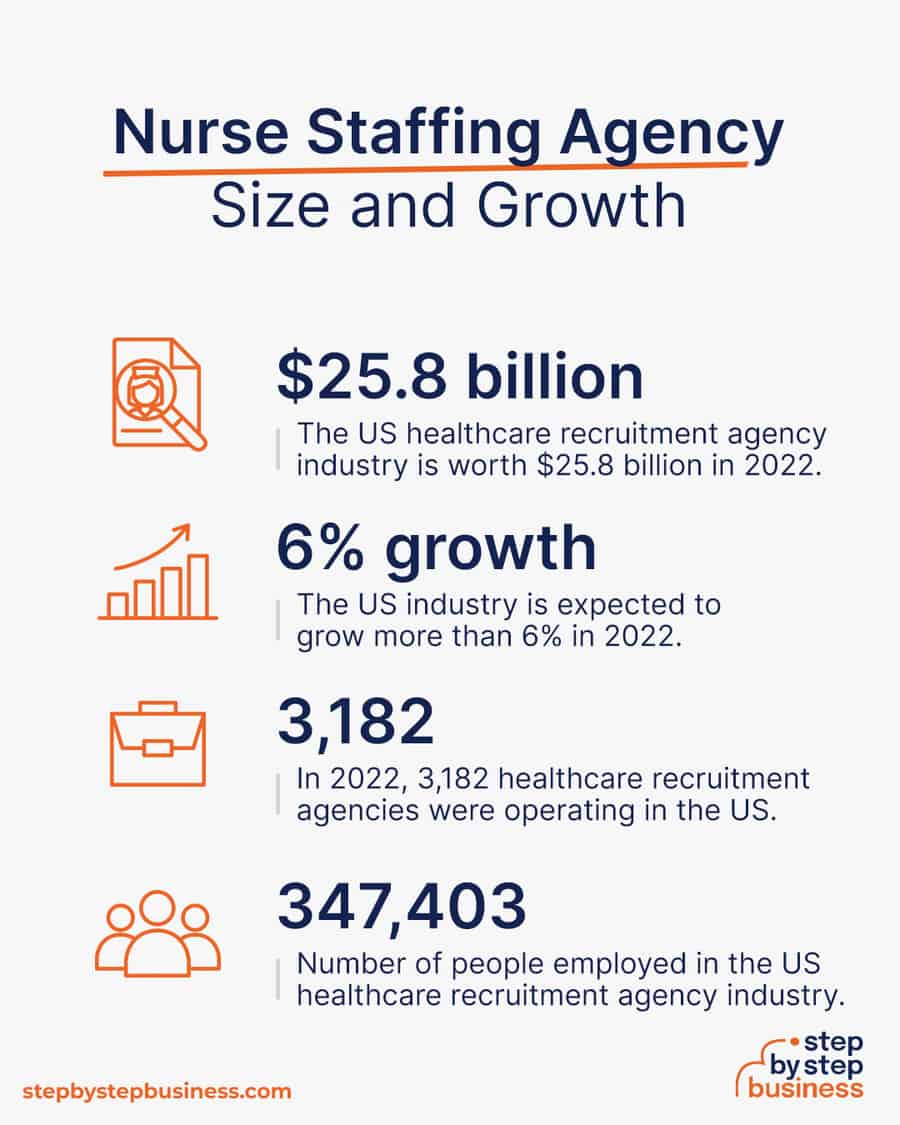
- Industry size and past growth – The US healthcare recruitment agency industry is worth $25.8 billion in 2022 after steady 4.4% growth the last five years. The industry has nearly doubled in the last decade.((https://www.ibisworld.com/industry-statistics/market-size/healthcare-staff-recruitment-agencies-united-states/))
- Growth forecast – The US healthcare recruitment agency industry is expected to grow more than 6% in 2022.
- Number of businesses – In 2022, 3,182 healthcare recruitment agencies were operating in the US.((https://www.ibisworld.com/industry-statistics/number-of-businesses/healthcare-staff-recruitment-agencies-united-states/))
- Number of people employed – In 2022, the US healthcare recruitment agency industry employs 347,403 people.((https://www.ibisworld.com/united-states/market-research-reports/healthcare-staff-recruitment-agencies-industry/))
Trends and challenges
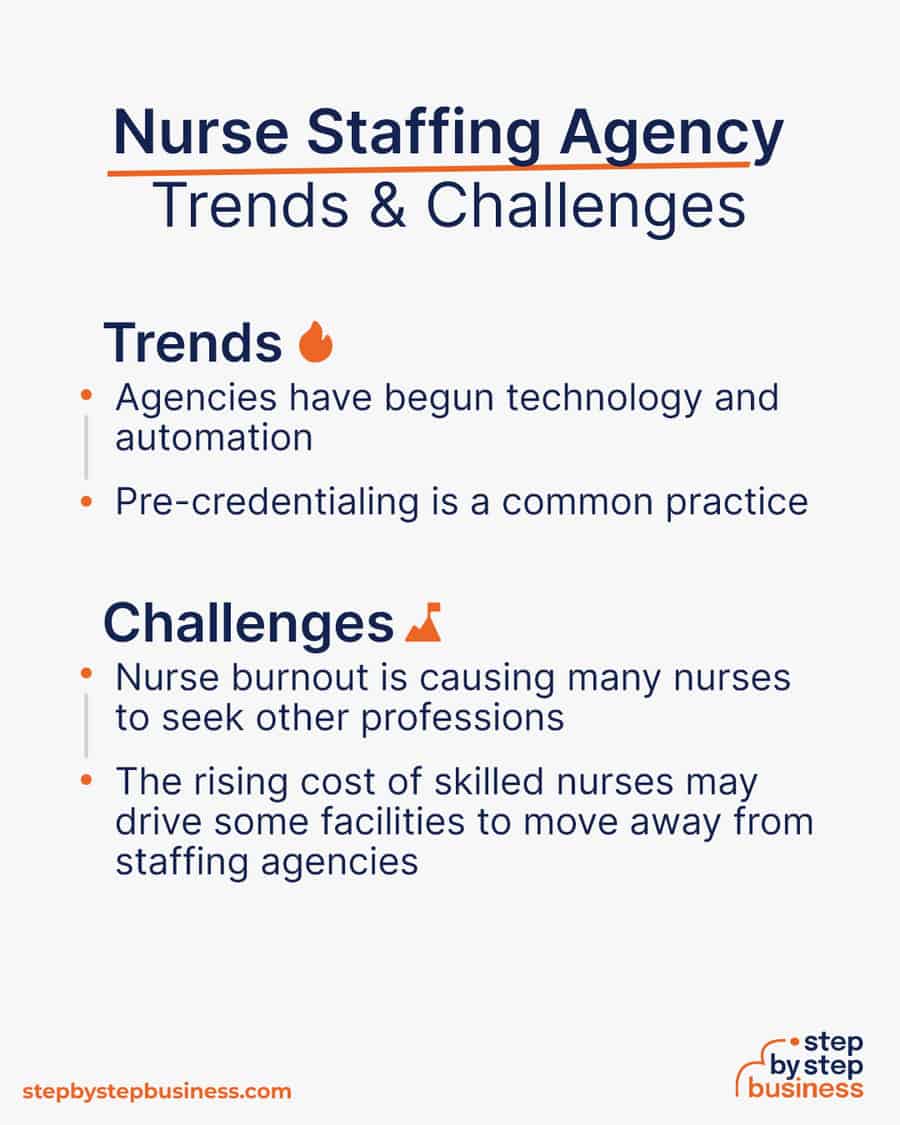
Trends in the nurse staffing agency industry include:
- Most healthcare staffing agencies have begun technology and automation to improve process efficiencies, such as database mining to find nursing candidates, which is obviously faster than a manual process.
- Pre-credentialing is an increasingly common practice that aims to quickly narrow down fields of candidates and speed up the recruiting process.
Challenges in the nurse staffing agency industry include:
- Driven by the pandemic, nurse burnout is causing many nurses to seek other professions, making nurse shortages even larger.
- The rising cost of skilled nurses may drive some healthcare facilities to move away from staffing agencies to eliminate the extra cost. They will instead go back to handling the recruiting process internally, which is likely to take longer and result in inferior health care.
Demand hotspots
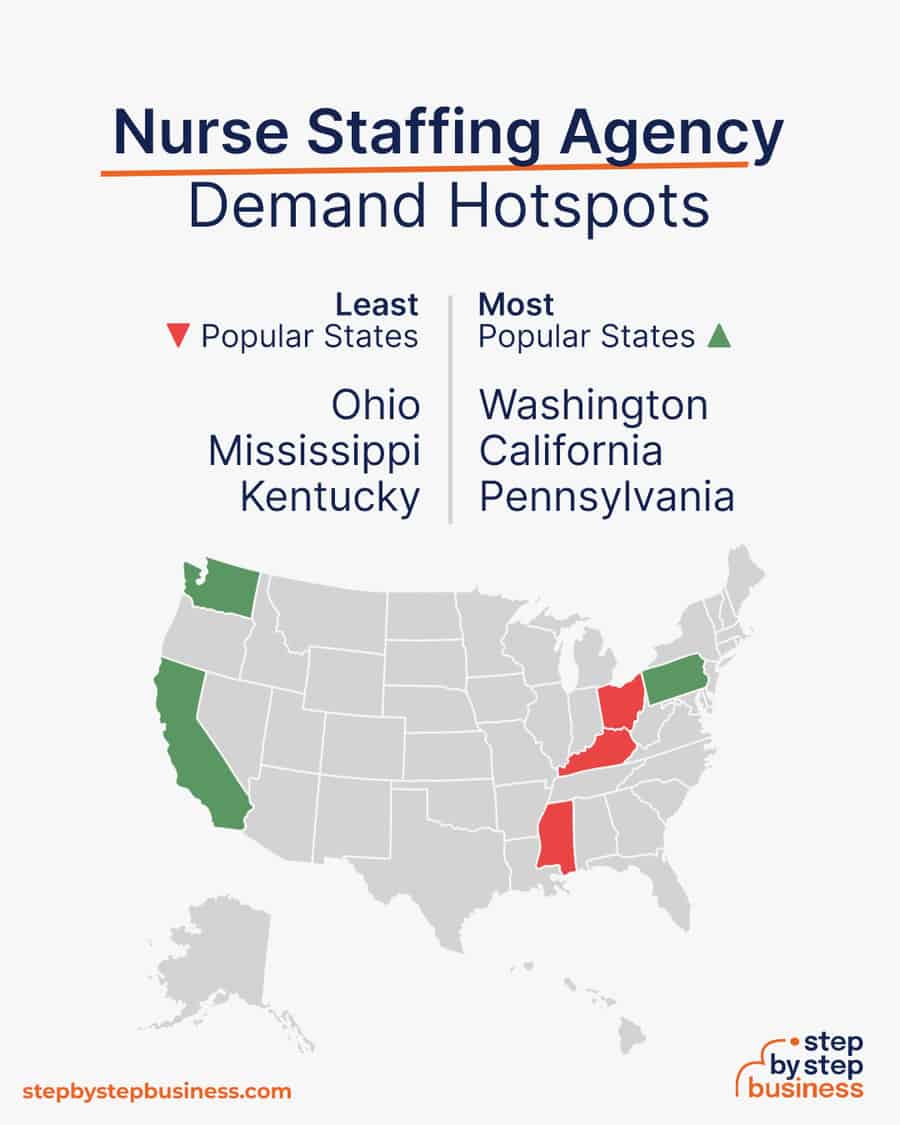
- Most popular states – The most popular states for nurse recruiters are Washington, California, and Pennsylvania.((https://www.zippia.com/nurse-recruiter-jobs/best-states/))
- Least popular states – The least popular states for nurse recruiters are Ohio, Mississippi, and Kentucky.
What kind of people work in nurse staffing agencies?
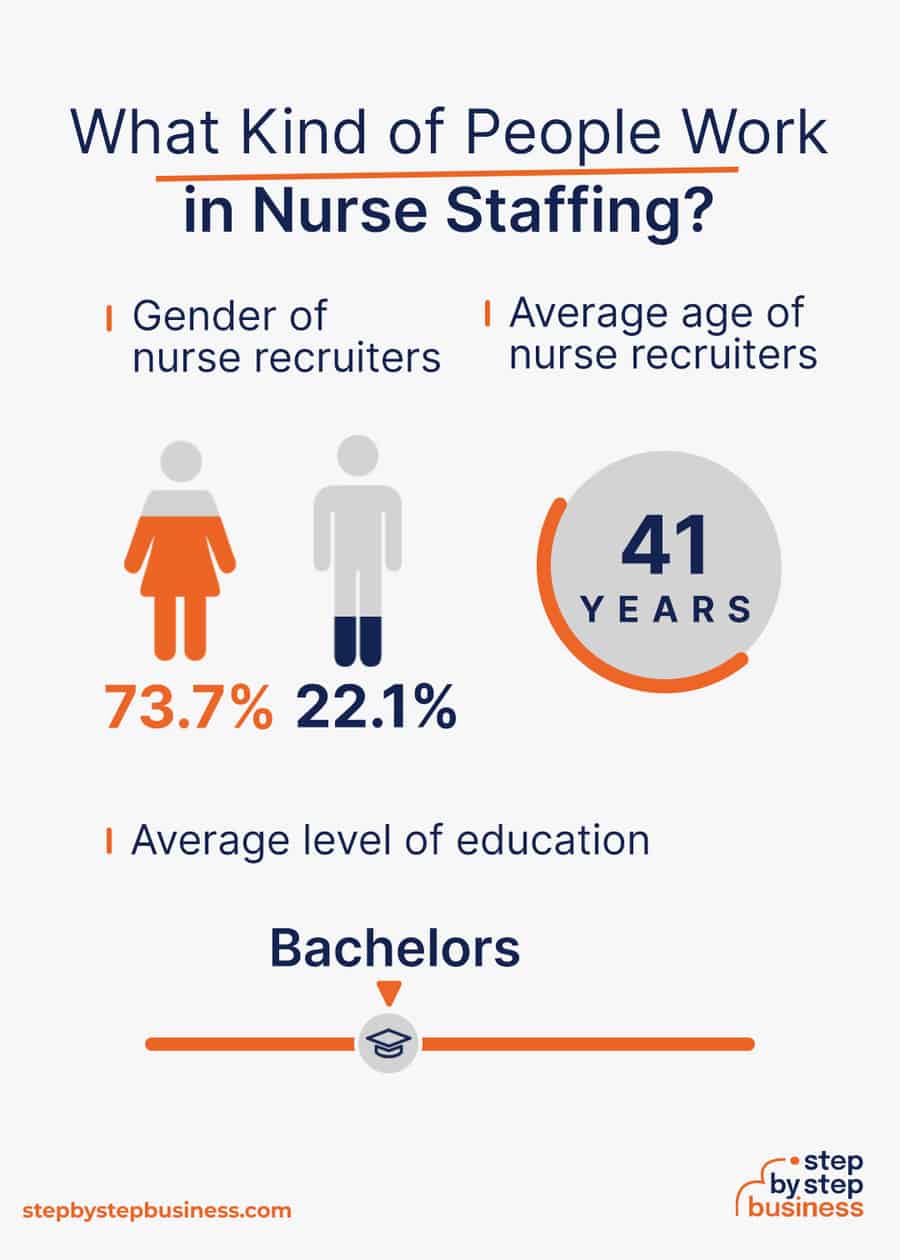
- Gender – 73.7% of nurse recruiters are female, while 22.1% are male.((https://www.zippia.com/nurse-recruiter-jobs/demographics/))
- Average level of education – The average nurse recruiter has a bachelor’s degree.
- Average age – The average nurse recruiter in the US is 41 years old.
How much does it cost to start a nurse staffing agency business?
Startup costs for a nurse staffing agency range from $3,500 to $10,000. Costs include a website, software, and nurse and healthcare facility databases.
| Start-up Costs | Ballpark Range | Average |
|---|
| Setting up a business name and corporation | $150 - $200 | $175 |
| Business licenses and permits | $100 - $300 | $200 |
| Insurance | $100-$300 | $200 |
| Business cards and brochures | $200 - $300 | $250 |
| Website setup | $1,000 - $3,000 | $2,000 |
| Software and databases | $1,000 - $4,000 | $2,500 |
| Marketing budget | $1,000 - $2,000 | $1,500 |
| Total | $3,550 - $10,100 | $6,825 |
|---|
How much can you earn from a nurse staffing agency business?
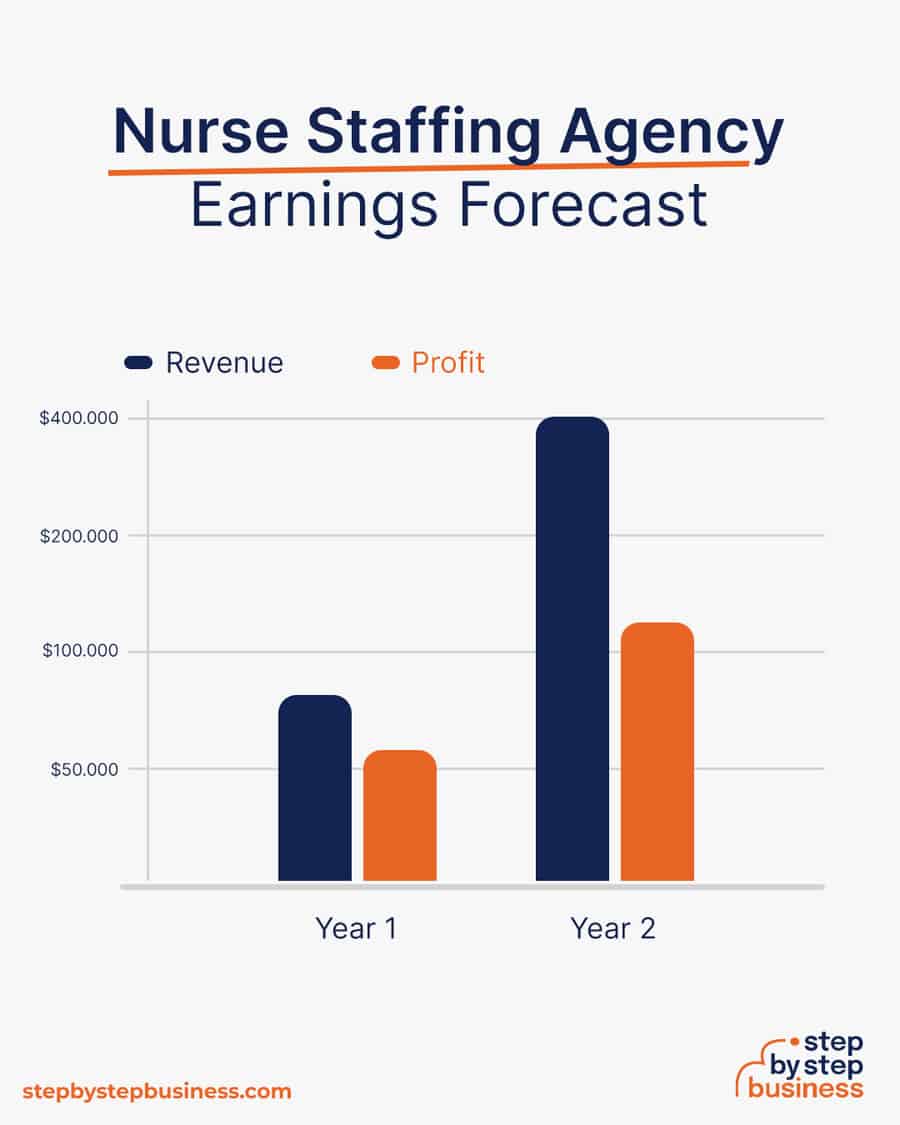
Generally, the nurse staffing agency fee is 25% of the nurse’s first-year salary. Your profit margin when you’re working at home should be about 70%.
In your first year or two, you could work from home and place 8 nurses in a year, each with a $40,000 contract, you’ll be bringing in $80,000 in annual revenue. This would mean $56,000 in profit, assuming that 70% margin. As you increase your networking and contacts, you could do 40 placements a year. At this stage, you’d rent a commercial space and hire staff, reducing your profit margin to 30%. With annual revenue of $400,000, you’d make an impressive profit of $120,000.
What barriers to entry are there?
There are a few barriers to entry for a nurse staffing agency. Your biggest challenges will be:
- The networking and sales skills necessary to get contracts
- The competition from established agencies
Related Business Ideas
If you’re still not sure whether this business idea is the right choice for you, here are some related business opportunities to help you on your path to entrepreneurial success.

How to Start a Home Health Care Business

13 Steps to Start a Successful Home Healthcare Agency

How to Start a Profitable Medical Delivery Service
Step 2: Hone Your Idea
Now that you know what’s involved in starting a nurse staffing agency, it’s a good idea to hone your concept in preparation to enter a competitive market.
Market research will give you the upper hand, even if you’re already positive that you have a perfect product or service. Conducting market research is important, because it can help you understand your customers better, who your competitors are, and your business landscape.
Why? Identify an opportunity
Research nurse staffing agencies in your area to examine their services, price points, and customer reviews. You’re looking for a market gap to fill. For instance, maybe the local market is missing a travel nurse staffing agency, an agency that recruits certified nursing assistants, or a temporary nursing agency.

You might consider targeting a niche market by specializing in a certain aspect of your industry, such as travel nursing or home nursing.
This could jumpstart your word-of-mouth marketing and attract clients right away.
What? Determine your services
Your services will be very straightforward. You’ll connect nursing candidates with health care facilities. You can specialize in certain types of nursing or work with all types.
How much should you charge for nurse staffing agency services?
Generally, the fee is 25% of the nurse’s first-year salary. Your profit margin when working by yourself should be about 70%.
Once you know your costs, you can use this Step By Step profit margin calculator to determine your mark-up and final price points. Remember, the prices you use at launch should be subject to change if warranted by the market.
Who? Identify your target market
Your target market will be nurses, hospitals and clinics, and healthcare organizations. You can find all of these on LinkedIn, and you can also find many nursing groups to connect with on Facebook. It’s also a good idea to buy access to the leading nurse and healthcare facility databases and reach out to those in your area. NurseRecuiter is a good place to start.
Where? Choose your business premises
In the early stages, you may want to run your business from home to keep costs low. But as your business grows, you’ll likely need to hire workers for various roles and may need to rent out an office. You can find commercial space to rent in your area on sites such as Craigslist, Crexi, and Instant Offices.
When choosing a commercial space, you may want to follow these rules of thumb:
- Central location accessible via public transport
- Ventilated and spacious, with good natural light
- Flexible lease that can be extended as your business grows
- Ready-to-use space with no major renovations or repairs needed
Step 3: Brainstorm a Staffing Agency Name
Here are some ideas for brainstorming your business name:
- Short, unique, and catchy names tend to stand out
- Names that are easy to say and spell tend to do better
- Name should be relevant to your product or service offerings
- Ask around — family, friends, colleagues, social media — for suggestions
- Including keywords, such as “nurse staffing” or “healthcare staffing”, boosts SEO
- Name should allow for expansion, for ex: “Synergy Staffing Solutions” over “TechTalent Solutions”
- A location-based name can help establish a strong connection with your local community and help with the SEO but might hinder future expansion
Once you’ve got a list of potential names, visit the website of the US Patent and Trademark Office to make sure they are available for registration and check the availability of related domain names using our Domain Name Search tool. Using “.com” or “.org” sharply increases credibility, so it’s best to focus on these.
Powered by GoDaddy.com
Finally, make your choice among the names that pass this screening and go ahead with domain registration and social media account creation. Your business name is one of the key differentiators that sets your business apart. Once you pick your company name, and start with the branding, it is hard to change the business name. Therefore, it’s important to carefully consider your choice before you start a business entity.
Step 4: Create a Nurse Staffing Agency Business Plan
Here are the key components of a business plan:

- Executive Summary: A brief summary of the nurse staffing agency business plan, highlighting its key points and objectives.
- Business Overview: A concise description of the nurse staffing agency, including its mission, vision, and core values.
- Product and Services: An outline of the specific services the agency will provide, such as nurse placement, staffing solutions, and related offerings.
- Market Analysis: An examination of the healthcare industry and the demand for nurse staffing services, including market trends and potential growth.
- Competitive Analysis: An assessment of the agency’s competitors in the nurse staffing market, highlighting their strengths and weaknesses.
- Sales and Marketing: A plan for promoting the agency’s services and acquiring clients, including sales strategies and marketing channels.
- Management Team: An introduction to the key individuals leading the agency, their qualifications, and their roles.
- Operations Plan: Details on how the agency will operate, including staffing procedures, technology systems, and day-to-day activities.
- Financial Plan: Projections of the agency’s financial performance, including income statements, cash flow, and balance sheets.
- Appendix: Supplementary materials, such as resumes, legal documents, and any additional information supporting the business plan.
If you’ve never created a business plan, it can be an intimidating task. You might consider hiring a business plan specialist to create a top-notch business plan for you.
Step 5: Register Your Business
Registering your business is an absolutely crucial step — it’s the prerequisite to paying taxes, raising capital, opening a bank account, and other guideposts on the road to getting a business up and running.
Plus, registration is exciting because it makes the entire process official. Once it’s complete, you’ll have your own business!
Choose where to register your company
Your business location is important because it can affect taxes, legal requirements, and revenue. Most people will register their business in the state where they live, but if you’re planning to expand, you might consider looking elsewhere, as some states could offer real advantages when it comes to nurse staffing agencies.
If you’re willing to move, you could really maximize your business! Keep in mind, it’s relatively easy to transfer your business to another state.
Choose your business structure
Business entities come in several varieties, each with its pros and cons. The legal structure you choose for your nurse staffing agency will shape your taxes, personal liability, and business registration requirements, so choose wisely.
Here are the main options:

- Sole Proprietorship – The most common structure for small businesses makes no legal distinction between company and owner. All income goes to the owner, who’s also liable for any debts, losses, or liabilities incurred by the business. The owner pays taxes on business income on his or her personal tax return.
- General Partnership – Similar to a sole proprietorship, but for two or more people. Again, owners keep the profits and are liable for losses. The partners pay taxes on their share of business income on their personal tax returns.
- Limited Liability Company (LLC) – Combines the characteristics of corporations with those of sole proprietorships or partnerships. Again, the owners are not personally liable for debts.
- C Corp – Under this structure, the business is a distinct legal entity and the owner or owners are not personally liable for its debts. Owners take profits through shareholder dividends, rather than directly. The corporation pays taxes, and owners pay taxes on their dividends, which is sometimes referred to as double taxation.
- S Corp – An S-Corporation refers to the tax classification of the business but is not a business entity. An S-Corp can be either a corporation or an LLC, which just need to elect to be an S-Corp for tax status. In an S-Corp, income is passed through directly to shareholders, who pay taxes on their share of business income on their personal tax returns.
We recommend that new business owners choose LLC as it offers liability protection and pass-through taxation while being simpler to form than a corporation. You can form an LLC in as little as five minutes using an online LLC formation service. They will check that your business name is available before filing, submit your articles of organization, and answer any questions you might have.



![]()









![]()

